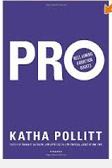 It’s been more than 40 years since the United States Supreme Court, in Roe v. Wade, limited the restrictions that states may place on abortion. For many of us, the fight for legal abortion seemed to be over. But in the intervening years an organized, effective opposition has persuaded several state legislatures, to chip away at a woman’s ability to terminate a pregnancy. The US Supreme Court has allowed them to impose restrictions such as waiting periods; required sonograms, parental permission for teenagers. Most chilling, opponents have now hit on the tactic, still being litigated, of imposing hospital admitting privileges so onerous (and unnecessary) that clinics will have to close because they are unable to comply. It’s an effective tactic that puts abortion out of the reach of many women, particularly poor ones. Yet most Americans continue to support the right to abortion, and more than a million abortions take place every year. How this disconnect happened, and what we can do about it, form the core of Katha Pollitt’s new book “Pro: Reclaiming Abortion Rights.”
It’s been more than 40 years since the United States Supreme Court, in Roe v. Wade, limited the restrictions that states may place on abortion. For many of us, the fight for legal abortion seemed to be over. But in the intervening years an organized, effective opposition has persuaded several state legislatures, to chip away at a woman’s ability to terminate a pregnancy. The US Supreme Court has allowed them to impose restrictions such as waiting periods; required sonograms, parental permission for teenagers. Most chilling, opponents have now hit on the tactic, still being litigated, of imposing hospital admitting privileges so onerous (and unnecessary) that clinics will have to close because they are unable to comply. It’s an effective tactic that puts abortion out of the reach of many women, particularly poor ones. Yet most Americans continue to support the right to abortion, and more than a million abortions take place every year. How this disconnect happened, and what we can do about it, form the core of Katha Pollitt’s new book “Pro: Reclaiming Abortion Rights.”
Pollitt points out that polls show there to be a large blurry middle consisting of citizens who support the right to abortion and take it for granted. Our sense of security in this right is baseless, she argues, and it is this middle whom Pollitt seeks to engage. One of the ways she does so is by telling the stories of women who’ve chosen to have abortions. She supports those stories with facts:
By menopause, 3 in 10 American women will have terminated at least one pregnancy; about half of all US women who have an abortion have already had a prior abortion; excluding miscarriages, 21 percent of pregnancies end in abortion . . . around 6 in 10 women who have abortions are already mothers.
Abortion isn’t for someone else, Pollitt argues, it’s for us: our mothers, our sisters, our daughters, or friends. The people who are hurt by the chipping away of access are ourselves and people like us.
Pollitt also takes apart the arguments of the small but vocal and persistent minority (approximately 20% of Americans, she says) who oppose abortion in all circumstances. Her points are consistently mordant. Here’s one example:
Do abortion opponents really believe that a fertilized egg or a pea-sized shrimp-like embryo is a child? True believers surely must. After all, American life is full of things large numbers of people consider coarse and callous and wrong, but nobody shoots up porn studios or burns down gambling casinos or physically waylays men seeking to enter massage parlors . . The anti-abortion movement . . . is also a protest against women’s growing freedom and power, including their sexual freedom and power.
That’s the crux of Pollitt’s argument: that the issue isn’t so much about the fetus, despite the large amounts of attention paid to it, but about the woman, and her sexuality. After all, it’s not as if the US pays much attention to the child – or mother – after the birth. In fact, she argues, underlying the opposition to abortion is the idea that women shouldn’t be having sex, certainly not sex for pleasure (even women who already have all the children they want or can support).
“Pro” is a necessary and deeply engaging book about an important issue. One final quote: “Few contemporary Americans would say a woman should marry a man just because she slept with him, so why should she have a baby just because she slept with him?” Do you agree? Let us know in the comments.
Have a book you want me to know about? Email me at asbowie@gmail.com. I also blog about metrics at asbowie.blogspot.com.



